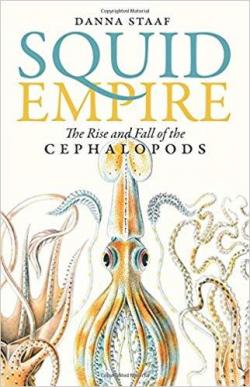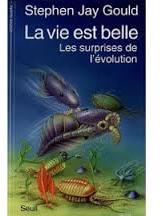
Danna Staaf/5
1 notes
Résumé :
Before there were mammals on land, there were dinosaurs. And before there were fish in the sea, there were cephalopods—the ancestors of modern squid and Earth’s first truly substantial animals. Cephalopods became the first creatures to rise from the seafloor, essentially inventing the act of swimming. With dozens of tentacles and formidable shells, they presided over an undersea empire for millions of years. But when fish evolved jaws, the ocean’s former top predato... >Voir plus
étiquettes
Ajouter des étiquettes
Que lire après Squid Empire: The Rise and Fall of the CephalopodsVoir plus
Critiques, Analyses et Avis (1)
Ajouter une critique
Pour tous les courageux prêts à lire en anglais de la vulgarisation scientifique sur les thèmes croisés paléontologie et biologie.... Un excellent opus, que j'ai dévoré, Squid Empire est un de ces livres qui vous passionnent, ne vous relâchent pas, même sur un sujet où vous avez fort peu de connaissances.
Il faut tout de même un certain niveau d'anglais, mais le ton enjoué et l'enthousiasme de l'auteur sont tellement délicieux, communiquent une telle passion, que les quelques virées dans un dictionnaire ne m'ont pas gênée du tout.
J'avoue: mes connaissances sur le sujet, que ce soit les céphalopodes modernes ou leurs cousins et ancêtres partis au paradis des mollusques, étaient assez faibles. A tel point que je ne savais pas que les seiches en étaient! Et pourtant, ça ne m'a pas arrêtée: voilà à quel point le propos est clair.
Intéressant, instructif, j'espère qu'il sera un jour traduit en français pour que je puisse l'offrir!
Il faut tout de même un certain niveau d'anglais, mais le ton enjoué et l'enthousiasme de l'auteur sont tellement délicieux, communiquent une telle passion, que les quelques virées dans un dictionnaire ne m'ont pas gênée du tout.
J'avoue: mes connaissances sur le sujet, que ce soit les céphalopodes modernes ou leurs cousins et ancêtres partis au paradis des mollusques, étaient assez faibles. A tel point que je ne savais pas que les seiches en étaient! Et pourtant, ça ne m'a pas arrêtée: voilà à quel point le propos est clair.
Intéressant, instructif, j'espère qu'il sera un jour traduit en français pour que je puisse l'offrir!
Citations et extraits (3)
Ajouter une citation
Paleontologists don't really need to come up with crazy ideas, at least when it comes to cephalopods. Evolution's got that departement completely covered- as we can see from the evolutionary arms race that happened over the course of the Mesozoic.
Three groups of predatory marine reptiles would seem to be more for anybody to contend with. But marine reptiles weren't the only shell breakers, and cephalopods weren't the only victims. The perpetrators of the Mesozoic's widespread shell predation were fish and shark, crabs and lobsters, and even snails, taking no pity on their kin. They crunched, cracked, drilled and pried their way into virtually every mollusk shell in the sea. The evolutionary results are recorded in rock, as natural selection drove ongoing advances in armor.
Three groups of predatory marine reptiles would seem to be more for anybody to contend with. But marine reptiles weren't the only shell breakers, and cephalopods weren't the only victims. The perpetrators of the Mesozoic's widespread shell predation were fish and shark, crabs and lobsters, and even snails, taking no pity on their kin. They crunched, cracked, drilled and pried their way into virtually every mollusk shell in the sea. The evolutionary results are recorded in rock, as natural selection drove ongoing advances in armor.
However, despite shell similarities with early fossils, today's nautiluses have evolved their own contemporary peculiarities. Their heads bear not eight, not ten, but anywhere between sixty and ninety tentacles. The number can vary even within a single species. To add to the confusion, nautilus tentacles are not elastic and have no suckers. Instead, each tentacle consists of a protective sheath and a long thin sticky part that can be extended or withdrawn. What's more, at some point in the nautilus's evolution the two uppermost tentacles seem to have enlarged and fuset to form a protective hood aver the animal. It's enough to make you throw up your hads and study snails instead, with one simple foot each.
Long before humanity was even a twinkle in the eye of the first mammal, our planet was rule by strange and fearsome creatures. Some grew to monstruous size, the largest animals the earth had ever seen. During their 400 millions years of glory they diversified to fill every niche, from voracious predators to placid grazer - and then a global cataclysm almost completely wiped them out. Only a humble few of their descendants survive to keep us company today.
Of course, I'm talking about cephalopods.
Of course, I'm talking about cephalopods.
autres livres classés : paléontologieVoir plus
Les Dernières Actualités
Voir plus
Quiz
Voir plus
Pas de sciences sans savoir (quiz complètement loufoque)
Présent - 1ère personne du pluriel :
Nous savons.
Nous savonnons (surtout à Marseille).
10 questions
411 lecteurs ont répondu
Thèmes :
science
, savoir
, conjugaison
, humourCréer un quiz sur ce livre411 lecteurs ont répondu
























